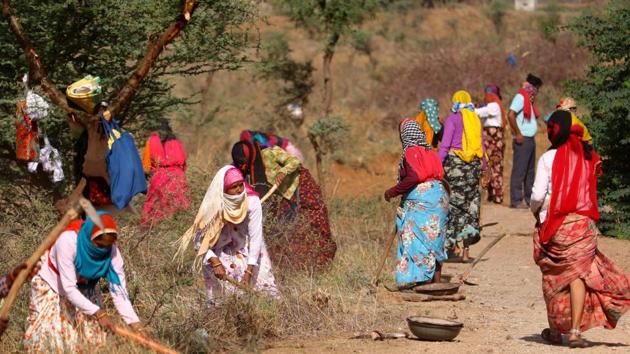- This fiscal year, the average number of days of employment provided per household under the Mahatma Gandhi National Employment Guarantee Scheme (MGNREGS) is at a five-year low.
- On January 20, the average number of days of employment provided per household was 42, compared to 50 in 2021-22, 52 in 2020-21, 48 in 2019-20, and 51 in 2018-19.

Why such unprecedented drop in employments?
- The programme has been plagued by systemic issues that are discouraging participation.
- Funding constraints have resulted in a reduction in work demand and delays in wage payments.
- App for attendance: The introduction of unnecessary technical complexities, such as an app for attendance at work sites, has resulted in additional hardships for workers, who will be more discouraged in the future.
- States’ bleak policies: With less than two months until the fiscal year ends, at least nine states and union territories have used less than 70% of projected person days.
- Budgetary reductions: With low utilisation, financial outlays for underperforming states are expected to fall even further in the coming fiscal year.
MGNREGS
- The Mahatma Gandhi National Rural Employment Guarantee Act of 2005 established the MGNREGS.
- This is a labour law and social security measure aimed at ensuring the ‘Right to Work’.
- V. Narasimha Rao proposed the act for the first time in 1991.
What is so unique about it?
- MGNREGS is unique in not only ensuring at least 100 days of employment to the willing unskilled workers, but also in ensuring an enforceable commitment on the implementing machinery i.e., the State Governments, and providing a bargaining power to the labourers.
- Failure to make a job offer within 15 days of receiving a job application from a prospective household will result in the payment of unemployment benefits to the job seekers.
- Any Indian citizen over the age of 18 who lives in rural India is eligible to apply for the NREGA scheme. The applicant should have offered to do unskilled labour as a favour.
- Employment must be available within 5 kilometres of an applicant’s home, and minimum wage must be paid.
- As a result, employment under MGNREGS is a legal right.
Why is MGNREGS in the news these days?
- Inadequate work: Despite its poverty levels, Bihar does not generate enough work to make a significant difference, while Kerala, on the other end of the spectrum, is economically better but has been using it for asset creation.
- There is no asset creation: There is no tangible asset creation. The committee will investigate whether the current composition of work undertaken under the scheme should be changed.
Issues in implementation
- Insufficient budgetary allocations: Increase in the nominal budget but actual budget (after adjusting inflation) decreased over the years.
- Constraints on the Approved Labour Budget: The Centre, through the arbitrary “Approved Labour Budget,” has reduced the number of days of work and capped funds through the National Electronic Fund Management System.
- Not so appealing wage rate: Currently, MGNREGS wage rates in 17 states are lower than state minimum wages.
- Wage payment delays: A worker is entitled to his or her due wages within a fortnight of completion of work under the MGNREGS, failing which the worker is entitled to compensation.
- No-work situations are becoming more common: None of the states were able to provide the full 100 days of employment required by the scheme.
- Data manipulation by authorities: According to a recent study, data manipulation in the MGNREGS is causing serious violations in its implementation.
- Corruption and wasteful spending: Many works sanctioned under MGNREGS appear to be ad hoc. They are frequently politically motivated hotspots for rampant corruption.
- Local governance is being weakened as a result of centralization: A real-time MIS-based implementation and a centralised payment system have left Panchayati Raj Institution representatives with virtually no role in implementation.
@the end
- In the midst of a pandemic, large-scale social security programmes such as MGNREGS face a number of challenges.
- The government and non-governmental organisations (NGOs) must study the impact of MGNREGS in rural areas to ensure that this massive anti-poverty scheme does not deviate from its intended path.
- MGNREGS must be viewed as an opportunity and explicitly included in a broad-based strategy to address any socioeconomic crisis.
Source: https://www.thehindu.com/news/national/employment-days-under-mahatma-gandhi-national-employment-guarantee-scheme-at-a-five-year-low/article66416657.ece#:~:text=Only%2042%20days%20of%20work,70%25%20of%20allotted%20person%20days&text=The%20average%20days%20of%20employment,year%20low%2C%20this%20financial%20year.
